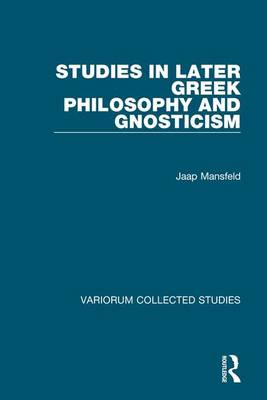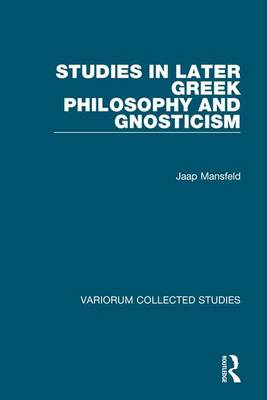
Bedankt voor het vertrouwen het afgelopen jaar! Om jou te bedanken bieden we GRATIS verzending (in België) aan op alles gedurende de hele maand januari.
- Afhalen na 1 uur in een winkel met voorraad
- In januari gratis thuislevering in België
- Ruim aanbod met 7 miljoen producten
Bedankt voor het vertrouwen het afgelopen jaar! Om jou te bedanken bieden we GRATIS verzending (in België) aan op alles gedurende de hele maand januari.
- Afhalen na 1 uur in een winkel met voorraad
- In januari gratis thuislevering in België
- Ruim aanbod met 7 miljoen producten
Zoeken
Omschrijving
It is a curious fact that many of the sources for the Presocratic and Stoic philosophers are early Christian authors; similarly, one can even find an echo of Parmenides in a Gnostic treatise from Nag Hammadi. Such writers were often dependent for their knowledge on a whole chain of previous interpretations and traditions, and it is these with which Professor Mansfeld is here largely concerned. He has tried to discover what in an earlier writer - Plato, and Aristotle, of course, as well as the Early Greeks - was of interest to a later one, notably the Middle Platonists. These articles demonstrate the value of such an approach, showing how a familiarity with the later history of an idea, say in a Gnostic text, can contribute to the understanding of the idea itself; or how the study of the selection of ideas used by Philo, for instance, not only sheds light on his own projects, but also helps explain why some motifs survived and not others, and why philosophical thought took the directions it did.
Specificaties
Betrokkenen
- Auteur(s):
- Uitgeverij:
Inhoud
- Aantal bladzijden:
- 336
- Taal:
- Engels
- Reeks:
Eigenschappen
- Productcode (EAN):
- 9780860782407
- Verschijningsdatum:
- 30/03/1989
- Uitvoering:
- Hardcover
- Formaat:
- Genaaid
- Afmetingen:
- 152 mm x 229 mm
- Gewicht:
- 616 g

Alleen bij Standaard Boekhandel
+ 366 punten op je klantenkaart van Standaard Boekhandel
Beoordelingen
We publiceren alleen reviews die voldoen aan de voorwaarden voor reviews. Bekijk onze voorwaarden voor reviews.









